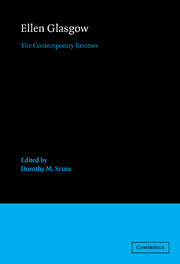Book contents
- Frontmatter
- Contents
- Series Editor's Preface
- Preface
- Acknowledgments
- Introduction
- The Descendant (1897)
- Phases of an Inferior Planet (1898)
- The Voice of the People (1900)
- The Battle-Ground (1902)
- The Freeman and Other Poems (1902)
- The Deliverance (1904)
- The Wheel of Life (1906)
- The Ancient Law (1908)
- The Romance of a Plain Man (1909)
- The Miller of Old Church (1911)
- Virginia (1913)
- Life and Gabriella (1916)
- The Builders (1919)
- One Man in His Time (1922)
- The Shadowy Third and Other Stories (1923)
- Barren Ground (1925)
- The Romantic Comedians (1926)
- They Stooped to Folly (1929)
- The Sheltered Life (1932)
- The Old Dominion Edition of the Works of Ellen Glasgow (1929-33)
- Vein of Iron (1935)
- The Virginia Edition of the Works of Ellen Glasgow (1938)
- In This Our Life (1941)
- A Certain Measure (1943)
- Index
Barren Ground (1925)
Published online by Cambridge University Press: 04 May 2010
- Frontmatter
- Contents
- Series Editor's Preface
- Preface
- Acknowledgments
- Introduction
- The Descendant (1897)
- Phases of an Inferior Planet (1898)
- The Voice of the People (1900)
- The Battle-Ground (1902)
- The Freeman and Other Poems (1902)
- The Deliverance (1904)
- The Wheel of Life (1906)
- The Ancient Law (1908)
- The Romance of a Plain Man (1909)
- The Miller of Old Church (1911)
- Virginia (1913)
- Life and Gabriella (1916)
- The Builders (1919)
- One Man in His Time (1922)
- The Shadowy Third and Other Stories (1923)
- Barren Ground (1925)
- The Romantic Comedians (1926)
- They Stooped to Folly (1929)
- The Sheltered Life (1932)
- The Old Dominion Edition of the Works of Ellen Glasgow (1929-33)
- Vein of Iron (1935)
- The Virginia Edition of the Works of Ellen Glasgow (1938)
- In This Our Life (1941)
- A Certain Measure (1943)
- Index
Summary
Joseph Collins, “Realism in a Southern Novel,” New York Sun, 4 April 1925, p. 7
Ellen Glasgow has been writing novels twenty-five years or thereabouts. They have earned her a distinctive and distinguished reputation in the literary world at home and abroad.
Until the advent of Barren Ground the summit of her progress had been testified by Virginia, an accurate and penetrating study of personality. Her latest book shows powers suggested but unrevealed by that or any of the others. Barren Ground is her masterpiece, and it will take its place with the best American fiction of this generation. Such a statement should have support beyond personal opinion. It is based upon the following facts, which I believe are incontestable: First, she has ruptured and dispelled the sentimental tradition of the South, that has made its literature with very few exceptions lifeless and artificial; second, she has set down the realities of life, and her characters are real people—they think, speak and act, live and die, love and hate, like real people; third, she has depicted a transformation of romance to reality that withstands the test of experience, and lastly, she has written an epic of the soil that compares with Knut Hamsun's Growth of the Soil and Alphonse de Chateaubriant's La Briere.
It need not be construed as disparagement of the reputation of Thomas Nelson Page, George W. Cable, and F. Hopkinson Smith to say that they adhered narrowly in their writings to the romantic tradition that all men are brave, chivalrous chivalrous and polite; that all women are fair, virtuous and self-sacrificing, and that God's images in the South are classifiable into four groups-good families, good people, poor whites and negroes.
- Type
- Chapter
- Information
- Ellen GlasgowThe Contemporary Reviews, pp. 237 - 270Publisher: Cambridge University PressPrint publication year: 1992



